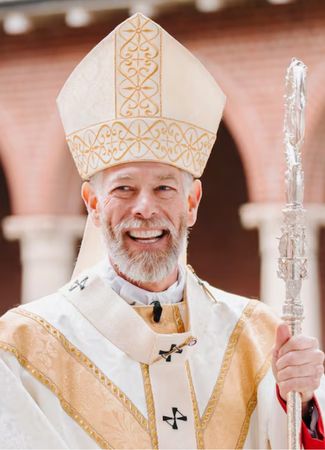Reflection on the Consecration to the Sacred Heart
by Archbishop Alexander K. Sample, Chairman of the Committee for Religious Liberty
On November 11, the bishops of the United States voted to consecrate this nation to the Sacred Heart of Jesus. The consecration will take place in 2026 to celebrate America’s semiquincentennial, that is, the two hundred and fiftieth anniversary of the signing of the Declaration of Independence. What does this mean? Why consecrate the nation to the Sacred Heart?
Devotion to the Sacred Heart has developed over the centuries following the experiences of St. Margaret Mary Alacoque and the apparitions she witnessed in the seventeenth century. Popes have lauded the practice of consecration of the self, home, and even whole nations to the Sacred Heart.1 In his encyclical instituting the Solemnity of Christ the King, Pope Pius XI, drawing on the teaching of Pope Leo XIII,2 commended the “pious custom” of consecrating the nation to the Sacred Heart of Jesus as a way to recognize the kingship of Christ.3 By celebrating this important national anniversary with this devotion, we have the opportunity to encourage all Catholics to honor our Lord and to “infuse the spirit of the Gospel into various communities and departments of life.”4
With his encyclical, Dilexit Nos, Pope Francis brought devotion to the Sacred Heart to the forefront of our contemporary Catholic life and culture. He noted: “In contemplating the pierced heart of the Lord, who ‘took our infirmities and bore our diseases,’ we too are inspired to be more attentive to the sufferings and needs of others and confirmed in our efforts to share in his work of liberation as instruments for the spread of his love. As we meditate on Christ’s self-offering for the sake of all, we are naturally led to ask why we too should not be ready to give our lives for others.”5 In Dilexi Te, Pope Leo invited us to contemplate Christ’s love, which moves us out on our mission to attend to our sisters and brothers suffering in the world today, particularly in our care for poor and vulnerable people. As we reflect with gratitude on the blessings God has bestowed on our country, our devotion to the Sacred Heart demands that we consider how we might foster truth, justice, and charity in American life. We are called to bring our faith into the actions we take and the lives we lead in our communities. We celebrate the ways the Church has contributed to a more just world, and we invite all in our society to see the face of Christ reflected in each sister and brother. We welcome God’s “kingdom of justice, fraternity and solidarity,”6 remembering that “God has a special place in his heart for those who are discriminated against and oppressed, and he asks us, his Church, to make a decisive and radical choice in favor of the weakest.7” This anniversary and consecration will be a great opportunity to promote the beautiful devotion to the Sacred Heart and to encourage the laity to offer their lives in service to God and their country.
1 For example, Pope Pius XII, Haurietis aquas, 17: “Indeed, happily there has begun a variety of projects which are conducive to a rekindling of this devotion. We refer to the formation of cultural associations for the advancement of religion and of charitable works; publications setting forth the true historical, ascetical and mystical doctrine concerning this entire subject; pious works of atonement; and in particular those manifestations of most ardent piety which the Apostleship of Prayer has brought about, under whose auspices and direction local gatherings—families, colleges, institutions - and sometimes nations have been consecrated to the Sacred Heart of Jesus.”
2 “Such an act of consecration, since it can establish or draw tighter the bonds which naturally connect public affairs with God, gives to States a hope of better things. In these latter times especially, a policy has been followed which has resulted in a sort of wall being raised between the Church and civil society. In the constitution and administration of States the authority of sacred and divine law is utterly disregarded, with a view to the exclusion of religion from having any constant part in public life. This policy almost tends to the removal of the Christian faith from our midst, and, if that were possible, of the banishment of God Himself from the earth. When men’s minds are raised to such a height of insolent pride, what wonder is it that the greater part of the human race should have fallen into such disquiet of mind and be buffeted by waves so rough that no one is suffered to be free from anxiety and peril? When religion is once discarded it follows of necessity that the surest foundations of the public welfare must give way, whilst God, to inflict on His enemies the punishment they so richly deserve, has left them the prey of their own evil desires, so that they give themselves up to their passions and finally wear themselves out by excess of liberty.” (Annum sacrum, no. 10)
3 Quas primas, no. 26
4 See Apostolicam actuositatem, no. 20.
5 Dilexit nos, no. 171.
6 Dilexi te, no. 16
7 Dilexi te, no. 16

